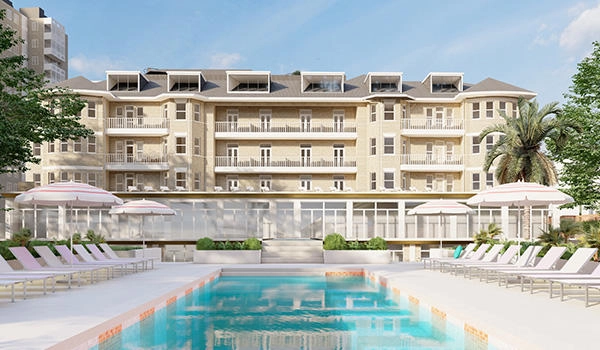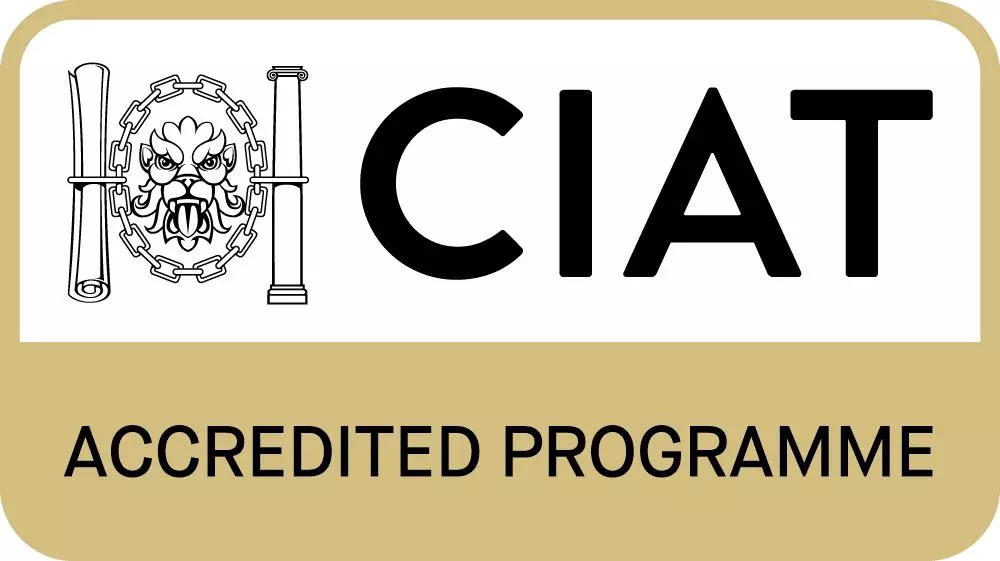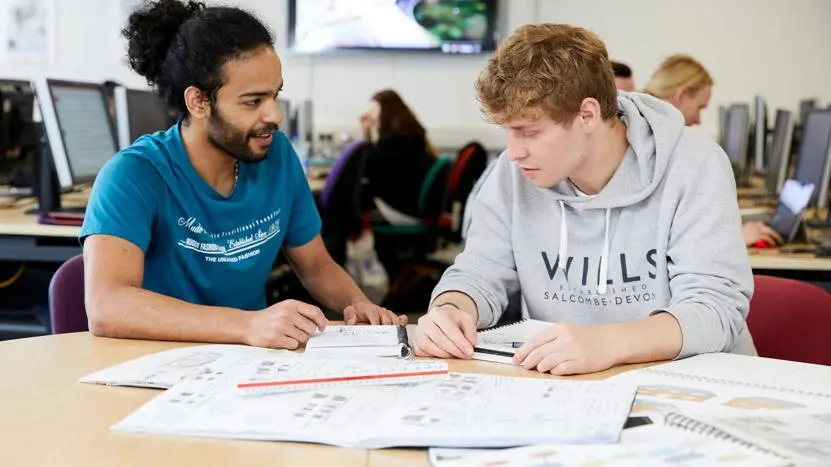
“Solent has prepared me to come into the construction industry with a great understanding of how it operates”


Build your architectural career with a professionally accredited degree that delivers industry specific skills and experience.
The course explores three branches of the fascinating architectural technology industry: design, technology and professional practice. This is complemented by modules in sustainable environmental design and Building Information Modelling (BIM).
Taught by a dedicated and well-qualified team, the architectural design and technology course is professionally accredited by the Chartered Institute of Architectural Technologists, meaning that the curriculum meets the specific needs of the architectural technology industry. Building on your existing HNC or HND qualification, the curriculum equips students with a strong grounding in architectural design, construction technology, technical design and professional practice.
Students also have the opportunity to work in our architectural technology studio. Fully-equipped with the latest version of industry standard software, this modern studio space was developed to give a sense of the feel and atmosphere of a working professional studio, bringing students together from various built environment courses to collaborate as they would in the real-world workplace.
Our graduates also regularly win top industry awards, including the Chartered Institute of Architectural Technologists' (CIAT) 2022 AT awards where recent graduate, Ian Westhead was awarded the Student Award for Excellence in Architectural Technology Project.
Contact international admissions
Email: Call:Accredited by:

Our creative degrees allow our students to develop a critical eye for design with a knowledge of different design approaches and problem solving techniques. Take a look at some of the great work they produce.

This course has been accredited by a professional body
This course has access to specialist facilities
You can study this course part-time
You can apply direct to Solent University for this course
This architectural design and technology course is for applicants who already hold a HNC or HND in a relevant architecture-related subject and who wish to gain a full BA (Hons) degree. It's also ideal for those who want to attain chartered status with the Chartered Institute of Architectural Technologists after graduation.
This course prepares graduates for a range of careers within a number of organisations, such as architectural and architectural technology practices, local authorities and building contractors.
The majority of our graduates find employment as architectural technologists within architectural practices, such as Corstorphine & Wright, ADAM Architecture, HPW, HGP Architects, Noviun Architects, HNW architects and even as far afield as Spain and Australia. Some graduates work for local government, such as Hampshire County Council and Dorset County Council.


Hear from Solent alumni about where their careers have taken them and how studying at Solent prepared them for their future.
Read more stories
“Solent has prepared me to come into the construction industry with a great understanding of how it operates”


Course Leader

Head of Architecture, Design and Built Environment

Senior Lecturer

Senior Lecturer

Senior Lecturer

Technician Instructor

Associate Lecturer

Senior Lecturer

Senior Lecturer

Lecturer
The University cannot guarantee any particular members of staff will teach specific aspects of the course in the future, but will endeavour to ensure the teaching team maintains their balance of experience and qualifications.
Facilities available to students include AutoCAD, Revit, Google SketchUp Pro, 3D printers and large format scanners. By using industry-standard hardware and software, Solent students can develop the specific skills required by the architectural technology industry such as sketching and computer-aided drawing – as well as transferable skills they can apply in other industries.
Our vibrant campus brings state-of-the-art facilities to enhance your learning and elevate your student experience. Our award-winning teaching building, The Spark is centred around students and offers a stimulating study environment with flexible learning spaces. Away from studying, why not try out the gyms, fitness studios and sports halls in our £28 million Sports Complex, or watch a blockbuster film at our student-run cinema with Dolby Atmos audio.
This module builds upon the knowledge and understanding of the principles of construction technology gained at Level 4. It is designed to provide you with an understanding of the technology used in creating modern complex buildings.
Building Information Modelling is a module that concentrates on Information and Communication Technologies (ICT) and their applications in the built environment.
This module will expose you to the nitty-gritties involved in procuring and successfully managing a construction project.
The module is designed to provide you with the knowledge and practical skills required to identify refurbishment solutions to improve building performance, align it to future needs and produce reports and record drawings of buildings.
Solent’s curriculum framework builds on our unique, creative and applied approach to teaching. The transformation of students’ lives is at the heart of our mission as a university, and our curriculum – informed by the latest theory – reflects this shared educational vision.
Find out more
The student achievement team are on hand to help you succeed during your studies at Solent. They aim to contact you at key times during your time here with personalised information, advice and guidance, by email or phone.
The disability advice team provides information, advice and guidance for disabled students.
All students can access Succeed@Solent, Solent's online guide to getting better grades. It offers extensive, practical information and advice on topics such as academic writing, research and presentations.
From the London skyline to Southampton’s own major development projects, you only need to look around to see how architecture in the UK is ever-evolving. Innovative buildings such as the Shard and the Gherkin, projects such as the Battersea Power Station development, and plans for the tallest residential building in the UK at South Quay Plaza reveal a flourishing industry – and an ever-increasing need for talented graduates with the right blend of technical skills and architectural vision.
The course has very strong links with the Chartered Institute of Architectural Technologists (CIAT). The CIAT, together with the CIAT South East Region, normally award prizes at our end-of-year show. The prestigious Building Research Establishment (BRE) Academy, and industry partners have also awarded prizes.
Gaining work experience is a key element of the course and students are encouraged to find work placements to build their skills in a real-life environment. Past students have found placements with companies such as Stride Treglown, LSH Architects, HPW, Simpson Hilder associates, BrightSpace Architects, and ADAM Architecture.

Graduate starting salary: £20,000 to £25,000
With a few years' experience at mid-level seniority, salaries fall between £24,000 and £45,000, rising to £60,000 at senior level.
Starting salary: £20,000 to £35,000
Salaries vary, depending on the sector. Experienced project managers could earn between £40,000 and £80,000, depending on the sector.
Part I architectural assistant: £15,000 to £20,000
As a Part II architectural assistant, salaries can rise to between £25,000 and £35,000 with experience. Fully qualified (Part III) architects could earn between £32,000 and £45,000.
The stated salaries are published on prospects.ac.uk. Income figures are intended as a guide only.


Hear from Solent alumni about where their careers have taken them and how studying at Solent prepared them for their future.
Read more stories
“Solent has prepared me to come into the construction industry with a great understanding of how it operates”

The Solent Careers team is committed to getting students into great careers.
While you are studying, the team can help you with finding work experience or placements, link you with a mentor, check your CV, or offer one-to-one guidance.
We also have graduate job opportunities just for Solent graduates.

Top 10
in the UK for graduate prospects - outcomes, a measure of the success in employability or further study of graduates completing their first degree (ranked 7 out of 50 institutions)
Complete University Guide, 2025
Accredited by:

Every student at Solent University will also have the option to study an additional Certificate in Practical Artificial Intelligence qualification alongside their course. Free of charge, the course ensures you'll be prepared for a fantastic and varied career after graduation.


Thinking about studying further than an undergraduate degree? Alumni can get 20% off their postgraduate study.

Develop your theory and practical skills to graduate from this course as a specialist designer with the education and vision required to help create a sustainable future for the construction industry.
The tuition fees for the 2025/26 academic year are not yet available. For guidance, the 2024/25 fees were:
For further information, please visit our tuition fees page.
While most course costs are covered by your tuition fees, some essential resources and optional extras may need to be paid for separately. These additional costs are listed below. For advice on budgeting and managing your money, please contact student.funding@solent.ac.uk.
The 2025/26 other costs are not yet available. For guidance, the 2024/25 costs were:
Compulsory costs:
Drawing equipment, printing and model making material: £150
Study trips: £50
Printing, model making and JCT contract: £150
Study trips: £50
Printing, model making, dissertation printing and binding: £150
Study trips: £50
Personal protection equipment for site visits, eg, safety boots, hi-vis jacket, hard hat - cost can range from £50-£100
Headset, microphone: up to £100
Optional costs:
Discretionary books, better quality folders, printing/binding: £150 per year
Optional study trips: £500
Solent University offers a range of bursaries and scholarships that provide financial assistance or waive fees for tuition or accommodation. Each bursary or scholarship has specific eligibility criteria. Check out our bursaries and scholarships pages to find out more.
Solent EU Welcome Scholarship (Fee Discount)
This scholarship is available to students from an EU country, with EU nationality, who are applying for an undergraduate course starting in September 2025. The scholarship will reduce your tuition fees to £10,500 per year - this includes foundation years.
Find out more about the scholarship
Cost of living support
At Solent, we understand that the cost of living crisis may be of some concern. To help, we've put together some detailed information to show what support is available and how to make your money go further.
There is no charge to attend graduation, but you will be required to pay for the rental of your academic gown (approximately £45 per graduate, depending on your award). You may also wish to purchase official photography packages, which range in price from £15 to £200+. Graduation is not compulsory, so if you prefer to have your award sent to you, there is no cost. Extra guest tickets will go on sale after results publication and will be sold on a first-come-first-served basis. The cost per ticket is currently £15. Please note, we do not guarantee there will be any extra tickets available to purchase.
Please select an option below:
This part-time route recruits directly to year three of the full five-year part-time course. Applicants must be in possession of a HNC/D in relevant subject, or equivalent.
Attendance on campus is approximately one day per week, 9am to 5pm.
It is desirable for applying students to be employed within the construction industry. Students will need to have a supporting reference from an employer as part of their application.
Contact our admissions team for more information: admissions@solent.ac.uk
For further information about UK, EU and international qualifications, please see our course entry requirements document.
Students from outside the EU are usually unable to obtain a visa for part-time study. Please visit our visas and immigration page for more information.
For further information about UK, EU and international qualifications, please see our course entry requirements document.
Contact international admissions
Email: Call:Full-time
Any student applying for the first year of a full-time/sandwich undergraduate course must apply through UCAS (University and Colleges Admissions Service). This includes mature, overseas and EU students.
Nearly all schools and colleges offer their students the facility of applying electronically through the UCAS website using 'Apply'; it may also be used by those applying independently in the UK and overseas. This facility and all course information can be found on the UCAS website: www.ucas.com.
Your application should reach UCAS by 31 January if you hope to enter a course the following autumn. Early application is advised for the most popular subject areas. Late applications may be made until the end of June. The UCAS Code for the University is S30, code name SOLNT.
Find out what happens after you apply
Contextual offers
Solent endeavours to offer learning opportunities to students from all backgrounds. When we receive and review an application, we take into consideration the context and personal circumstances of applicants when making a decision, which means our advertised entry tariff could be reduced.
Top-up route:
We welcome applications from students currently studying a Foundation Degree, DipHE, HNC, HND or modules of an undergraduate degree course at another university, who wish to enter directly into Years 2 or 3 of one of our undergraduate degree courses. Please contact our admissions team for more information: contact us
Applicants who do not have English as their first language will be required to demonstrate an approved level of proficiency in the use of the English language. The agreed minimum requirements for this course are:
Qualifications are checked before enrolment, and international students must bring their original certificates or certified copies when coming to study at the University.
Pre-Sessional English programme
The University also offers a pre-sessional English programme for international students who wish to improve their level of English before starting a degree course.


